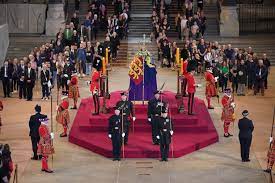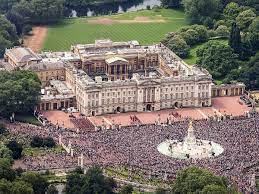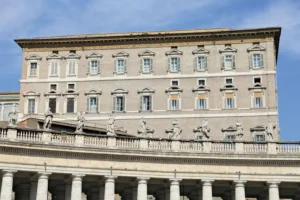The funeral ceremonies of Her late Majesty Queen Elizabeth II were a sight to behold. They summoned up Wordsworth’s lines about the grandeur of London in the early nineteenth century:
Earth has not anything to show more fair:
Dull would he be of soul who could pass by
A sight so touching in its majesty…

What prompted billions across the globe to be glued to their screens during the week-long obsequies? It was heartening to see the religious conviction of a modern monarchy; consoling to watch grief and gratitude enfolded under a magnificent blue sky; and to appreciate the amazing dignity and grace of regalia. The ceremonials were a fitting tribute to a monarch who valued truth, goodness and beauty, Christian virtues par excellence. As in life, so in death.
As I looked at commoners in never-ending queues filing past the Queen’s coffin with a bow before, my mind travelled back in history. Britain was a seat of the Roman Catholic faith from the third century onwards. In circa AD 1601, Ethelbert of Kent became the island’s first Catholic king. Other kings followed suit. Interestingly, Elizabeth II could trace back her lineage to the first king of all of England, Athelstan (895-939 AD), and his father Edward the Elder and grandfather Alfred the Great, of the House of Wessex.
Clearly, neither monarchy nor Christianity was foreign to Britain. The country had a long communion with Rome, but alas, King Henry VIII ended it in AD 1534, forming the Church of England, also known as the Anglican Church. However, much of the Roman Catholic tradition persists, being particularly close to the hearts of the Anglo-Catholics, products of the Oxford Movement led by John Henry Newman, who later converted to Catholicism and became Cardinal. That ensures that Britain remains Rome’s closest natural ally.
 Another facet that unites Britain and Rome is the institution of the monarchy. Whereas the former is now a constitutional, hereditary monarchy, whose titular, historically, was granted the title ‘Defender of the Faith’ by the Parliament; the latter is an elective, non-hereditary monarchy, in which the Pope is the leader of the Universal Catholic Church. While in Britain, the ability to make and pass legislation resides with an elected Parliament, in Rome the Pope has ‘the fullness of legislative, executive and judicial powers’, aided by cardinals, regarded as ‘princes of the Church’.
Another facet that unites Britain and Rome is the institution of the monarchy. Whereas the former is now a constitutional, hereditary monarchy, whose titular, historically, was granted the title ‘Defender of the Faith’ by the Parliament; the latter is an elective, non-hereditary monarchy, in which the Pope is the leader of the Universal Catholic Church. While in Britain, the ability to make and pass legislation resides with an elected Parliament, in Rome the Pope has ‘the fullness of legislative, executive and judicial powers’, aided by cardinals, regarded as ‘princes of the Church’.
In a world not very acquainted with monarchies, it is never too much to underline that the monarchical state draws from an ancient principle evident from the Bible (and non-Christian cultures as well): that monarchs were chosen by God to rule His people. While Queen Elizabeth II has had close to forty generations of monarchs preceding her over the last thirteen centuries, Rome has produced 266 Popes since the first century.
Numbers apart, whether or not monarchies are still relevant in the contemporary world is a more important issue. Indeed, it appears that a well-functioning monarchy is a great asset. Unlike elected representatives, monarchs rise above the uncertainties of the next election and focus on the next generation. As upholders of tradition, they instil a sense of pride in the people and offer stability in troubled times. Considering that most of the monarchies today have a constitutional status, it is hardly likely that they should turn tyrannical.

Britain’s Queen of happy memory presided over one of the longest functioning monarchies in the world. For her part, the Catholic Church is unique in showing how a head of state can have a monarchy with a blend of aristocratic and democratic elements too. St Thomas of Aquinas recognised the value of a king – “a shepherd seeking the common good of the multitude” – but strongly opposed an absolute monarch. How it will all pan out, with a new monarch in London and a Synod on Synodality coming up in Rome, only time will tell.
Banner: https://medium.com/@steverob1066_3899/non-angli-sed-angeli-a1a3d1f7656c
Every article you write Oscar is just a unique experience. Beautifully written.
Excellent article: informative, erudite, intriguing, captivating.
Queen Elizabeth Il in her own way gave a new meaning to monarchy and always gave huge importance to religion and Roman Catholicism. No one felt any difference about the faith and Church of England. That’s how she became a much loved Queen even by the subjects of the former British Colonies. The Queen is dead, long live the Queen.
Dear Óscar, excellent article about British monarchy underlining beautifully the role of the late Great Queen Elisabeth II. May She rest in peace and her exemplary life inspire her family and people in these troubled times!
Thank you!
Interesting read.Time will tell.
This was really educative for me. I never really thought about monarchy and religion. Liked your thoughts on how both are linked.
Great commentary Oscar.
Well, the British long reigning Monarch was much loved not just in her country but the Commonwealth too though most of the world has gone past acceptance of Monarchies and some have only ceremonial roles in the democratic countries they reign. Charles, the new King, more so because of his failed marriage to the much adored Diana and his present age may not command much respect.
Queen Elizabeth was the epitome of humility and grace much desired in many rulers. May her soul rest in peace.
Very informative and enlightening article . Learnt a lot about the British Monarchy.
Very educative sir. Always the best.
It has taken me 42 years in italy and Oscar de Noronha to learn there have been 266 Popes. As for the English monarchy, humanity will always have five real kings: hearts, diamonds, clubs, spades and the King of England.
I happened to read Oscar de Noronha’s article after I had a glimpse of the funeral procession route of Her Late Majesty Queen Elizabeth II. It was splendorous to walk through the routes taken by the funeral cortege. And a visit to the Westminster Abbey summed it all up.
To me the ceremonies held were the continuation of Catholic tradition.
Westminster Abbey still has Latin verses.
May her soul rest in peace. Amen.
This article brought back memories of my days in Mombasa, Kenya, we sang the National Anthem n remember waving this flag,this is a gracious Queen
Great piece, Oscar! Between London and Rome gives an inspiring multi-faceted insight into Her Majesty’s life, her strong Christian faith and the Monarchy. It nostalgically reminds us of the magnificence of Christian civilization rejected by the contemporary egalitarian world. The world yearned for the ideals she represented and hence clamoured “God Save the Queen”.
The article has brought to the forefront the importance of the monarchy in the times we live in. As it instils good values, uprightness and etiquette in the society.